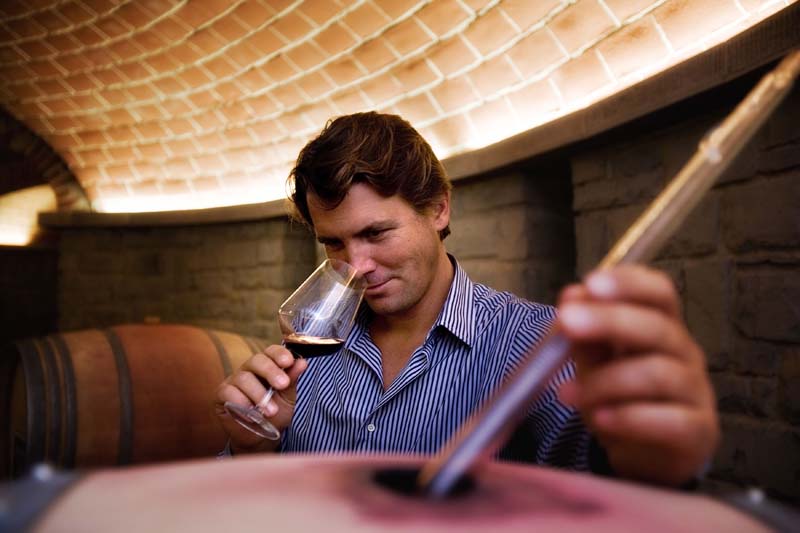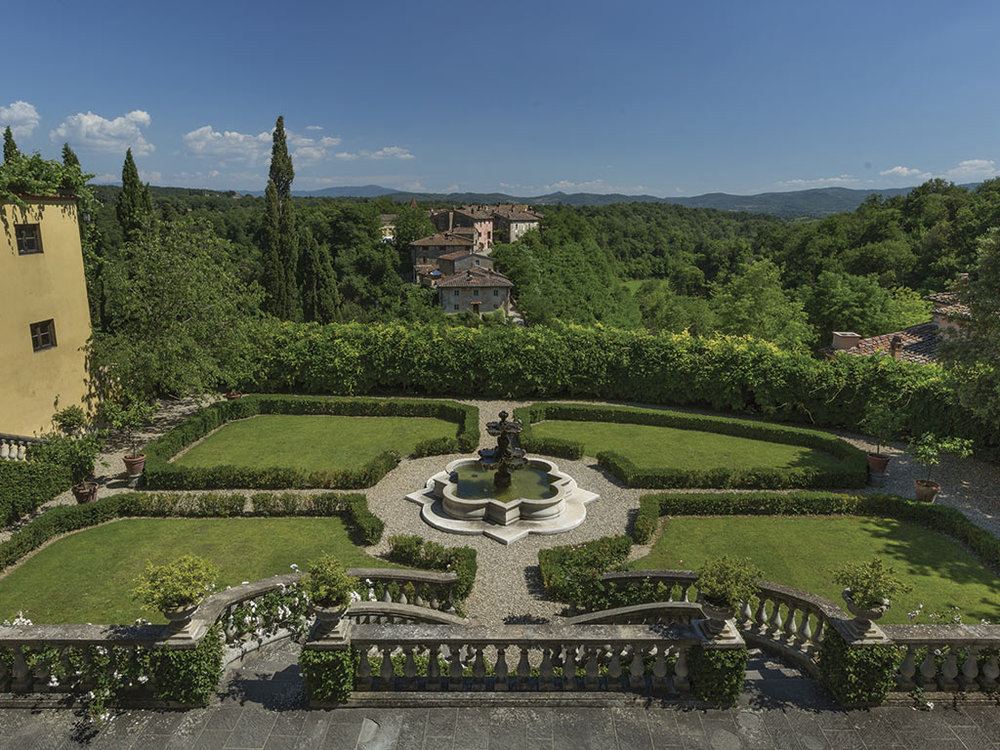D2D Interview: Salvatore Ferragamo

When our Italian buyer Greg St. Clair told me that Salvatore Ferragamo was coming to K&L in San Francisco on Sunday, October 1st for a special public tasting, I felt bad telling him that Salvatore Ferragamo passed away back in the early sixties so that wasn't possible. Greg knows I have a thing for Ferragamo shoes, so I thought maybe he was playing a joke on me, but then he clarified: "It's his grandson; he has the same name, but he's the family winemaker." Suddenly everything made sense. I'd seen the Salvatore Ferragamo name thrown around in articles talking about the family's Il Borro estate in Tuscany, both a proper winemaking facility as well as a luxury hotel destination, but I had always assumed they were talking about the fashion company as a whole. Not the case! They were indeed referring to Salvatore Ferragamo Jr, the dashing third generation superstar who has taken the family business to the next level by producing a portfolio of well-received Super Tuscans. Born and raised in one of the world's most iconic fashion families, how is it that someone who looked like a fashion model, clearly destined for a career in the world of haute couture with a famous name and chiseled jaw line, found himself toiling away in the cellar, making Sangiovese blends instead of walking the runway? I was interested, so I gave him a call earlier in the week and we chatted about that very subject. Our conversation is below:
David: Having had the chance to join one of the world’s most iconic fashion empires, your family’s Ferragamo luxury clothing line and your namesake, what made you decide to become a winemaker instead?
Salvatore: Well, my father bought the Il Borro property and that gave me the option to either join the fashion side of the company or the wine side. I thought to myself: there’s already so much that’s been done on the fashion side, but here I’ll have the opportunity to start something from ground zero. That’s exciting; when you’re starting from scratch but still contributing to the groundwork of what’s been done by your family.
David: When did your dad buy Il Borro? Was that back in 1993?
Salvatore: Yes, that’s correct.
David: What kind of condition was it in? I know it was owned by a famous duke or aristocrat previously, but was it being using to make wine at that time?
Salvatore: No, we had to replant everything. The property was in a terrible state of disrepair. Everything had been abandoned. It was very bad and it needed a lot of work (laughs).
David: But that gave you the opportunity to start over with your own vision, right? You didn’t necessarily have seventy year old Sangiovese vines to work with.
Salvatore: Yes, we decided to choose the varietals based on the different types of soil we had on the property. As the French would say: you make the wines according to the terroir. So we did and that’s been our philosophy ever since. In January of 2015 we turned organic with our farming practices, so now we have sort of a two-pronged approach: matching the vine to the terroir, as well as organic viticulture practices.
David: Which varietals do you currently have planted?
Salvatore: Merlot, Cabernet, Syrah, Sangiovese, and Chardonnay.
David: Sort of the new wave approach to the Tuscan vineyard. I think I also read somewhere you were experimenting with amphorae clay pots as aging vessels instead of oak?
Salvatore: Yeah! We make a wine called Petruna Anfora from 100% amphora wines with no oak. It’s interesting because it doesn’t have any of the toast from the barrique. Instead it’s more about the fruit and the pureness of it, which is lovely. There’s more minerality in the wines, plus it was interesting to try and recreate the traditional methods like they made wine in the old days—like the Romans and the Etruscans.
David: How did the first vintage go? That was just recently, I think.
Salvatore: Yes, we just finished selling the first vintage. We started with the 2015 vintage and we sold out, so now we’re working on the second release in November.
David: How has traditional Italy adapted to the new Super Tuscans and the inclusion of Cabernet and Merlot in the blends? Are the Tuscan locals excited by the evolution or resistant, in your opinion?
Salvatore: Italy has changed quite a bit and I think the public is adapting to the idea of new world wines. The culture is less rigid. It’s well proven at this point that we can make great wines in a different style and I think that’s exciting. It’s still a young concept—Sassicaia was the first to make a Super Tuscan back in the sixties—and after centuries of making wine I think the idea of experimentation is well accepted now.
 The Ferragamo family Il Borro estate
The Ferragamo family Il Borro estate
David: How was it growing up for you in traditional Italy? Did your family drink a lot of wine?
Salvatore: Yes, wine was always a big part of our family culture. Growing up in Tuscany, everyone is producing wine, so I was familiar with the subject. When I first started working at Il Borro I got certified as a sommelier, which helped me to better understand the process, but of course working at the winery itself was the real education. Wine was always available when I was growing up, often and everywhere.
David: What do you like to drink personally? What excites you about wine?
Salvatore: I think there are three great elements to wine: the varietal, the vintage, and the region, which makes experimentation fun. There’s so much to learn. Of course, I love everything from my friends at Sassicaia—the Ornellaia and the Masseto are wonderful wines—but I also love Bordeaux. Château Haut Brion is one of my favorites. There are many different and fantastic visions out there for wine.
David: I’m someone who thinks there’s a big correlation between fashion and alcohol. Growing up in a fashion empire, do you see similarities between the two industries?
Salvatore: I think it depends on what you’re doing in fashion. If you’re making T-shirts, that’s one thing. If you’re making high-end, luxury haute couture items, then it’s another and it’s more similar to what we’re doing at Il Borro, where we’re farming organically, using a fiberoptic sorter, a gravity-flow winery, temperature-controlled steel vats, and extremely selective barriques. I think taking this level of care is what separates the luxury industry from the general market, so in that sense it is like fashion.
David: Did growing up in the Ferragamo family help to prepare you for the rigors of such high quality production?
Salvatore: To a certain extent. My family has always been detail oriented when it comes to luxury, so that definitely helped. That level of scrutiny translates over to winemaking where being selective and always in search of the maximum quality is important. That’s our commitment at Il Borro. We want to be recognized as a quality producer.
David: Do you ever find that the wine gets lumped in with the Ferragamo empire rather than being recognized on its own merit?
Salvatore: Yeah, and I think that’s an important point. For that reason we want to keep the two businesses separate: one is wine and one is fashion. It is important that the wine becomes successful on its own merit. It’s a question of brand integrity and it’s up to me to produce wines that are made with a quality-oriented philosophy. We can’t simply piggyback on the Ferragamo name.
David: Since we’re talking about the Ferragamo brand, I have a personal curiosity. I’ve always thought of the Ferragamo shoe portfolio as the best in the business. My wife and I both swear by Ferragamo and, while I don’t really collect wine, I definitely have a small collection of Ferragamo shoes. But lately I’ve been noticing the belts and the jackets really take off. I was reading the other day about how the belts are really becoming big in Asia and in some cases cost more than the shoes! In your opinion, what’s the quintessential Ferragamo fashion item?
Salvatore: Shoes. I would say the shoes, for sure. I think their quality and comfort speak to the best of Ferragamo.
David: While your grandfather, whose name you carry on, became famous while making shoes for stars like Audrey Hepburn, you’re establishing your own reputation with the Il Borro wine. Who’s someone who you’ve been able to sell wine to or perhaps drink wine with that you were excited about?
Salvatore: There are several, but there is one that stands out. I had the chance to drink with Richard Gere once at the property who dined with our family and enjoyed the wines.
David: Oh wow! Did your dad try to sign him as a shoe model while he was there?
Salvatore: (laughs) No, but I think there was some swooning at the table.
(Salvatore will be in the San Francisco tasting bar this coming Sunday, October 1st, if you want to come by and meet him while tasting the wines—details to come!)
-David Driscoll
